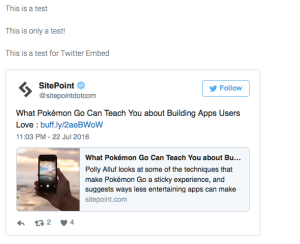
In this episode of the Versioning Show, Tim and David are joined by Sherry Walling, a licensed clinical psychologist with a special interest in technology-related issues. They discuss the particular pressures of life in the tech world, imposter syndrome and how to deal with it, public speaking, self care and the value of a therapist, open-source guilt, jumping off cliffs, and the fear of spiders.
Show Notes
- Sherry on Twitter: @zenfounder
- Sherry’s ZenFounder podcast.
- Sherry’s website
- Psychology Today
- Open Source Guilt & Passion
- Leadership, Guilt, and Pull Requests
- What Is Open Source & Why Do I Feel So Guilty?
- Open Source Guilt
- Open Source Guilt
- Say hello on Twitter: @mdavidgreen | @tevko | @versioningshow | @sitepointdotcom
Conversation Highlights
I think a lot of people who work on distributed teams or who work remotely, while they might have connections through Slack and ongoing conversations with people throughout the day, they’re often very isolated. I think that can wear on folks over time.
The pressure to stay up with all the technology, to stay informed, to stay, again, on top of all of the new versions that are coming out constantly — that’s a unique stressor. That hasn’t quite existed in this same way in the world before this.
He thought that this sense of inferiority, or being less than, is sort of this totally normal hallmark of human development — that it’s because we feel this sense of inferiority that we have any drive or sense of striving.
I think the first thing really is to repeat over and over and over in your own head like,
This is normal. I am not unique about feeling this.If nothing else, it’s also a sign that you’re pushing into the edges of your ability.
You’re not going to know everything. You’re not going to be on top of everything. Especially in technology. So get comfortable with that.
There’s this moment right before you jump where you’re like,
I am going to die. This is the stupidest thing I’ve ever done. I’m totally going to die.Then you just take a breath and you jump.
I think when you try, people appreciate that. The more that you put yourself out there, the more connections that you have, the more fun you have, the more influence you have, the more your work is known.
You don’t have to go every week for the rest of your life and talk about your mother ad nauseam, but you should have some sort of mental health professional that you have a connection to that you can call when you need to. It’s just part of self care.
You’ve decided to offer something and people can use it or not use it. It’s OK to have boundaries, and it’s OK to say,
Hey, no, man. I’m sorry it’s not working for you, but that’s that.You’re not responsible to babysit it for the rest of your life.

Transcript
- Tim:
-
Hey, what’s up everybody? This is Tim Evko …
- David:
-
… and this is M. David Green …
- Tim:
-
… and you’re listening to episode number 21 of the Versioning podcast.
- David:
-
This is a place where we get together to discuss the industry of the web from development to design, with some of the people making it happen today and planning where it’s headed in the next version.
- Tim:
-
Today we have the pleasure of speaking with Dr Sherry Walling, who is a doctor of psychology. We are going to speak with her all about the tech industry, things that we struggle with working in the tech industry. So let’s go ahead and get this version started.
- David:
-
Sherry, we’re really glad to have you here today. Thanks for joining us.
- Sherry:
-
Hey, it’s my pleasure. I’m glad to talk with you guys.
- David:
-
Cool. We haven’t had a lot of people on this show who haven’t worked themselves in tech. We do like to start the show with a philosophical question. Our philosophical question for you is: in your current career, what version are you? And why?
- Sherry:
-
Well, I’m a new version — that’s for sure! I come from a very (well, relatively speaking) old industry — an old guild — of people who do psychotherapy, and practice psychology. I am one of the folks on the cutting edge of figuring out how to combine those skills with new technological advances, including doing remote consulting and therapy work. In different states. Using some of the technology that’s available that allows me to work with people all over the world.
That’s a little bit of a new thing in my community. Just this concept of remote work and having remote clientele. I don’t know what version it would be, but also a newer version in terms of thinking about how to meet the specific needs of the people who are making tech happen. Thinking about the psychological needs, and the unique challenges that technologists have.
- David:
-
That’s fun. It’s interesting. What attracted you to that aspect of your field?
- Sherry:
-
Well, I’m going to have to blame my husband to some extent! My history is in clinical psychology, and I have worked a lot with people who have very high stress jobs — military personnel, first responders, emergency room physicians. Those are the kind of people that historically I’ve worked with.
The longer I’ve been around the tech industry — and it’s been about 15 years now, as I’ve been on the periphery of the tech community watching my husband Rob found multiple companies, watching them sell, watching them go through these event iterations. I realized there’s a lot of crossover between the kinds of demands of the highly stressed professionals I was working with and the kinds of challenges that technology folks experience — particularly founders and entrepreneurs.
It was a natural fit to be able to combine some of the work that we do. We co-host a podcast together where we talk about mental health and wellbeing and family life and relationship life among people who are in the middle of the startup world.
- Tim:
-
I have to admit, sitting in front of my computer, typing in a sometimes air conditioned room doesn’t always feel very stressful. But there is stress in the tech environment. I’m wondering what types of stress you often encounter in those areas.
- Sherry:
-
I think there are some unique stresses that have to do with isolation. I think a lot of people who work on distributed teams or who work remotely, while they might have connections through Slack and ongoing conversations with people throughout the day, they’re often very isolated. I think that can wear on folks over time. That’s one of the stressors that I end up talking a lot with people about.
I think especially for folks who are pursuing their own ventures, how to cope well with failure is a big challenge. I think especially when you are investing your intellect and your abilities and your ingenuity into an idea and it doesn’t work out, there’s a lot of identity that’s tied up with the success or failure that you experience. It’s maybe not a kind of crisis stressor — you’re not running from a fire or anything — but I think there are some deeper stressors that technologists experience.
- David [4:10]:
-
You mentioned crisis stressors and there are different levels of stress. I’m curious how that reflects itself in what you’re seeing with the people you work with.
- Sherry:
-
Yeah, I think we talk about acute stress and chronic stress. Acute stress is that emergency response — you know, the server is down, none of our emails are being sent, the customers are all angry, everybody is staying up all night to fix this until it’s done. That certainly does happen in the tech world.
But I think the chronic stress — the day in, day out things not working well, or feeling worn down, feeling overworked, feeling under appreciated, feeling isolated, having conflict with the team, having conflict with a manager or a boss — those are the kinds of things that tend to wear on people and really deplete people’s resources, that lead to burnout, lead to unhappiness in the long run.
- David:
-
I wonder how much of what you’re seeing do you feel is more distinct to tech as opposed to other fields where people do work in distributed offices, sometimes people have day to day stresses. But tech has its own unique set of challenges, I believe.
- Sherry:
-
Yeah, I think you’re right. I like to say that everyone is a special snowflag and no one is a special snowflag. The kinds of things that we feel, the kind of stress that we feel, that I feel as a professional, that you feel as a professional, it’s not that new. I think the language that we use to talk about it — the particular problems that keep us up at night — those are unique to the different industries that we work in, and those are I think unique to the challenges that technologists face. It’s both/and — both unique and both not unique. Is that too philosophical for you? Sorry! [Laughs]
- David:
-
No, no, that’s fine. I think it can be difficult sometimes for people in tech to realize that the stresses that they’re facing really aren’t unique to humanity as a whole, even though they feel like such new, different things, because things are changing so constantly in our field.
- Sherry:
-
Yeah, and again, there’s truths to that. The pressure to stay up with all the technology, to stay informed, to stay, again, on top of all of the new versions that are coming out constantly. — that’s a unique stressor. That hasn’t quite existed in this same way in the world before this. But, feeling overwhelmed, feeling like you can’t quite keep up with everything — that in itself is not a new feeling.
- Tim:
-
Speaking to that, one of the things that we alluded to in one of our most recent episodes was actually bringing someone such as yourself on the show to talk about something very specific that comes up a lot in our industry in one of these issues. That is the issue of imposter syndrome. We talk about this a lot. I’ve ranted about this a lot. Hopefully you haven’t heard any of those rants because they’re probably entirely incorrect, but I’d love to get your opinion on the topic, what causes it, and how we can get over it, of course.
- Sherry:
-
Well, I think the bad news maybe is that it’s really normal and universal and probably you can’t get over it.
- David:
-
We’ll just end the show there.
- Tim:
-
Episode over.
- Sherry:
-
Sorry, you’re screwed!
[Laughter]
I think understanding it is the real task. It’s called imposter syndrome now. It used to be called an inferiority complex, and that was a term coined by Alfred Adler who was a contemporary of Freud. So it’s been around a very long time. He thought that this sense of inferiority, or being less than, is sort of this totally normal hallmark of human development — that it’s because we feel this sense of inferiority that we have any drive or sense of striving.
It’s not a bad thing if you use it well. If you can understand what it is and how to talk to yourself about it and not let it sabotage you or ruin the kinds of things that you’re trying to do.
- David:
-
Well, that obviously leads to the question, how can we use it well? It feels like such an impediment to progress.
- Sherry [8:05]:
-
Yeah, I think the first thing really is to repeat over and over and over in your own head like,
This is normal. I am not unique about feeling this.
If nothing else, it’s also a sign that you’re pushing into the edges of your ability. If everything was easy and comfortable all the time, that’s great. You’d be working in a factory pushing buttons. It would be easy. There would be no risk and no challenge.The fact that you feel some inferiority or you feel some risk or you feel some edginess of,
Oh my God, can I actually do this?
means that you are living a life where you’re pushing into your own edges. I would argue that that’s a good thing. That’s a hallmark of your own effort.First tactic, tell yourself it’s normal. Second tactic, tell yourself that it’s a good sign of the kinds of challenges that you’re giving yourself. Then I think the third tactic is ask yourself, “How is this shaping the decisions I’m making or the ways that I’m coming across to others? How is my internal sense of inferiority coming out in the world? How do I need to rein that in?” If those voices are too strong, they keep you from taking risks.
- David:
-
Yes, and I’ve definitely experienced that, and I’ve certainly talked with friends who’ve had that same issue. It’s interesting, though. I’ve talked mostly with friends in tech. This is something I’ve noticed since I started working in tech.
- Sherry:
-
Yeah, because I think, again, you’re pushing into edges. As the technology advances, as the language is developed, as there are new apps for all kinds of different things. There’s new integration. There’s new things. It is impossible for you to stay completely on top of all of the latest versions of everything. You’re not going to know everything. You’re not going to be on top of everything. Especially in technology. So get comfortable with that.
- Tim:
-
I find that often the area where imposter syndrome really presents itself is that I feel like I’m going to get found out and they are going to fire me or push me away out of that inner circle, or everyone is going to think that I’m some sort of person who is bad at my job or who has been lying this whole time. Is that sort of the same in regard to these solutions you’ve prevented? Or is there a different way at looking at those sort of intrusive thoughts?
- Sherry:
-
Yeah, I think you’re adding two elements. One is this idea of intrusive thoughts. That these are thoughts that just come into your mind at any time, any inconvenient time, and they speak loudly and they overpower your thought process. I think the second issue that you’re raising is the issue of shame. Like,
I feel inferior and I have to hide that from other people so they don’t find out.
Then you’re hiding. You don’t want to be seen. You’re afraid that your weaknesses will be found out. I think both of those are really important problems to tackle. Certainly this idea of intrusive thoughts: I think most of us can predict to some extent when our imposter syndrome is going to get triggered. For me, it’s like when I’m at a conference, or when I’m trying to prepare a talk, and all of a sudden I’ve decided,
I don’t know anything about anything. I can’t believe I’m doing this. I’m definitely calling in sick. This is just a total waste of everybody’s time.
Those kinds of moments when we are, again, pushing into our edges — we can prepare ourselves for the fact that,
Oh my gosh, these intrusive thoughts are going to be strong. This is going to be a time where I am really, really vulnerable to this kind of self-discouragement.
I think that there’s probably a strategy to be proactive in reiterating,This is what I know, this is what I’ve done, and hey, I just have to keep putting myself out there, and if they find out they find out. So what?
- David:
-
One of the things that I like about this is you’re relating this also to the public speaking that you yourself are doing, and it’s kind of become required of engineers and people in tech fields because we have to put our work out into the open source, we have to publish our code, we have to create a public identity for ourselves in order for people to find and recognize us. I think that’s something that’s new and unique perhaps to this early 21st century time that we’re living in.
- Sherry [12:10]:
-
Maybe why this idea of imposter syndrome has become so live in the tech industry is because there is this expectation of this very public presence. People are seeing you. They’re seeing your work. They’re hearing your voice. They critique your language, or the ways that you put words together. Once you’re out in the world in this public sphere, then I think that imposter syndrome can take deeper roots, because you can’t hide. You can’t hide what you don’t know or what you mispronounce or what you’re a little foggy about.
- David:
-
I’ve heard that fear of public speaking is the number one fear people have?
- Sherry:
-
That’s what I’ve heard! They’d rather die than go onstage. [Laughs]
- David:
-
How did you push through that? You’ve put yourself out there. You have a podcast, and you’re out there giving presentations.
- Sherry:
-
I’m afraid of spiders. I’m not afraid of public speaking.
[Laughter]
On one hand, I just got a little bit lucky. On the other hand, I grew up in rural northern California, where what we did for fun in the summers was to find cliffs or bridges and jump off of them into the various lakes and rivers around the area. There’s this moment right before you jump where you’re like,
I am going to die. This is the stupidest thing I’ve ever done. I’m totally going to die.
Then you just take a breath and you jump.I think that’s a little bit of the model for the career decisions that I’ve made — which I’m not necessarily recommending, I’m just confessing! That the more risks you take, and the more you put yourself out there, it might not go well. But generally, I think when you try, people appreciate that. The more that you put yourself out there, the more connections that you have, the more fun you have, the more influence you have, the more your work is known. Anyway, I think it’s just a cost benefit analysis, and a little bit of take a deep breath and jump.
- Tim:
-
Well, that is certainly excellent advice, and definitely something that I’ve noticed. For me, the first time I ever realized how terrifying public speaking was, was as soon as I got done and someone asked a question. Then I was like,
No, no, no. Don’t do that. You’re going to be asking me things that I haven’t necessarily prepared for. Let’s just skip to the end.
- Sherry:
-
I don’t have a script for that.
- Tim:
-
Yes, exactly. Exactly. No slides to help me out with that one. That being said, switching gears for a second, what I’m curious about is how you see technology helping the field of psychology?
- Sherry:
-
Oh, man. Great question. I think like the rest of the world the field of psychology has benefited from increased access to information, the ease of access to information, the ease of collaboration. We probably don’t collaborate as much as we should, but we can. You can get a second opinion from a specialist at a clinic in Texas if you’re having a psych evaluation in a hospital in California.
I also think that there are now lots of ways to access therapy, whether that’s through some of the online services, some peer-to-peer support services, the suicide hotline. There are ways that people can, from the privacy of their own home, work with a trained professional without experiencing maybe some stigma of going to a shrink’s office, or without having to take off work. I’m hopeful that therapy and psychological care will continue to become more and more accessible because of the technological advances that make that possible.
- David:
-
I think you’re also making the information about what you’re doing more available because of the availability of all these media sources and resources available to us now.
- Sherry:
-
Yeah, I feel like my agenda talking to all of the technologists I do is really just to say that psychologists aren’t scary. If you need one at some point, don’t hesitate. If you find a weird one, just leave and find a different one.
- David [16:04]:
-
I think a lot of us do need to talk to therapists at different times in our careers, and I do think there’s a stigma associated with it. How can people get past that stigma and really start feeling comfortable with this?
- Sherry:
-
I’m really a pragmatist about this. I have people change the oil in my car, I have people cut my hair. I have all kinds of people that help me with different parts of my life, because I’m not trained in those things, and I’m not good at them, and I can’t automatically see what needs to happen and what should be done.
And so, a therapist, a psychologist, is just another one of those in that suite of possible professionals that you could talk to about a part of your life that you might not have perfect insight into. I think it’s like part of just good personal maintenance. Especially, again, if you’re in a stressful job or if you are someone who is on the edges of technology and you experience a lot of stress and pressure. Then have a relationship with a psychologist. You don’t have to go every week for the rest of your life and talk about your mother ad nauseam, but you should have some sort of mental health professional that you have a connection to that you can call when you need to. It’s just part of self care.
- David:
-
I’m sure there are people out there right now who would be interested in something like that, but they wouldn’t really know where to start looking.
- Sherry:
-
Yeah, I think there are definitely some good services online. Like Psychology Today, where you can search by your neighborhood, search near your office. Look for people, look at their profiles. It’s a little bit like online dating, except there’s no swipe right or left, whatever.
I think do your research. Go to see somebody who’s gone to a reputable school, or somebody who looks like they’ve put some thought into how they present themselves online. The most important thing about your relationship with your personal mental health professional is whether you like and trust them. You need to meet them in person or online, however that happens. Use your discernment. Do they seem like a reasonable human being? Are they someone that you trust? Are they someone that you want to talk to? That’s really the simple litmus test.
I don’t think that technologists necessarily need a specialized therapist. I think sometimes founders or executives do benefit from somebody who has a little bit of an inside information into what that particular life is like. Anybody who is a halfway decent mental health professional is going to really get to know you and learn about your life and will be a student of your work — such that you can fill them in on the important things that they need to know.
- Tim:
-
I did have one more question. That is the subject of open-sourced guilt, which is this idea that when you make a project and push it out into the public where everyone can use it, you are suddenly inundated with requests to fix this thing, and people can sometimes be hostile or people can demand that you add features or support them for this totally free software that you worked on your own time to create.
We’ve spoken with and we see in our industry people who have really struggled with this, and almost considered giving up working on free, open-source software altogether. I’m wondering what advice you would have for … I guess two types of people. The people who work on these free, open-source things and get stressed out when there’s this litany of requests and sometimes hostile people. Then the people who are hostile, who are receiving this free thing and then suddenly demand that they get more of that.
- Sherry:
-
Yeah, man. I think people who decide to put something out into the world for free should really feel OK about having boundaries about how far they want to go to maintain it. It is OK to offer something, and if people don’t like it, haters gonna hate. There’s a sense of that does not reflect on you, it does not reflect on your quality in the community, it doesn’t reflect on the quality of your work.
You’ve decided to offer something and people can use it or not use it. It’s OK to have boundaries, and it’s OK to say,
Hey, no, man. I’m sorry it’s not working for you, but that’s that.
You’re not responsible to babysit it for the rest of your life. At least, that’s not my understanding of the code of ethics around open-source software. Are you expected to maintain it forever? - David [20:24]:
-
I think some people who use it would expect you to.
- Tim:
-
Definitely not. I mean, think of the pace at which things go out of date. There are ten other versions of everything you could ever think to need.
- Sherry:
-
I think at the end of the day, when you’re brushing your teeth and getting ready for bed, you just have to feel good about the way that you are ethical in the world. You have to feel good about what you have put out there in the world and let yourself rest with that. I certainly would not want to be motivated by guilt, or by being bullied or badgered to do any kind of work that I didn’t want to do or choose to do.
If you care about it, and you want to take care of it, good. Do it. If it’s a product of guilt and a product of bullying, then we have to work through those parts of ourselves that are vulnerable to being manipulated that way. That’s what it is. You’re being manipulated. It’s not something that you want or are choosing to do for the wellbeing of yourself or the community.
- David:
-
Wow, Sherry. It is so comforting and so affirming to hear the way you talk about this. I know that a lot of our listeners are going to want to hear more from you and get in touch with you. Can you let us know how people can find you online?
- Sherry:
-
Sure, I’m @zenfounder on Twitter. That’s also the name of my podcast. People can find me at sherrywalling.com. The site’s kind of crappy. I’m reworking it, but you can get my contact information there.
- David:
-
Maybe we have a technologist out here who can help.
- Sherry:
-
Yes.
- David:
-
Cool. Thank you so much for joining us. This has been a real pleasure.
- Sherry:
-
My pleasure, guys. Thanks for having me.
[Musical interlude]
- David:
-
I genuinely felt comforted by that.
- Tim:
-
Yeah, same here. It’s really nice to hear someone … I think for two reasons. It’s nice to hear someone say,
It’s OK to feel those things
that you generally feel as those long time stressors in your career. Also, it’s comforting to hear someone say that from the outside of the industry. - David:
-
That’s true. Also, to be reminded that it’s normal, and that what we’re feeling is not unique to tech — even though it feels that way sometimes.
- Tim:
-
Yeah, that I think was my favorite thing. We’re so wrapped up in this industry; this is what we do to put food on the table. When someone reminds you this has been happening since the dawn of time. Human behavior never really changes. All of these things we just invent new names for them. We write more books and articles and blog posts about these things that have existed since the dawn of time. It’s really interesting to know that history has dealt with this before, and here’s how.
- David:
-
Sure. When she said the phrase
inferiority complex
I immediately recognized that. For some reason, I never mapped that concept onto this concept. It’s a clear comparison.The one thing I was kind of disturbed about was that it sounds like this is really not something that you can get rid of. It’s more something that you have to accommodate yourself to and integrate into the way that you’re thinking. Make it a positive force in your life and recognize the positive nature of it.
- Tim:
-
Yeah. I would say that my main issue with imposter syndrome is the idea that, like I said, the intrusive thoughts. The things that come into the back of your head and say,
If so and so finds out about this, I’m finished. If my boss finds out that I’m really not that great at CSS, then they’re going to get angry and fire me.
Just like Sherry said, if it happens, it happens. You are pushing yourself, you’re learning more, you’re going into new environments, and you will run into times where somebody finds out that you don’t know X, Y, and Z. As much as that is their job to handle something like that gracefully, it’s a good pointer on your life that you are challenging yourself and taking risks. That is how we get better at this.
- David [24:12]:
-
That’s true. I was thinking back, and most of the times that I have seen people terminated, at various points — laid off, fired, et cetera — it has not been because they didn’t understand the technology that they’re working on. It’s usually been for personality conflicts and issues like that, or for financial issues. Just that the company didn’t plan properly.
But, of course, there are times when somebody has taken on a job and gone through the interview process and been hired but actually doesn’t have the skills necessary to do the work. At times like that, a manager does need to come in and either re-train or release the employee.
If we’re pushing ourselves hard enough that we’re really trying to learn new things and really trying to expand in our careers, probably we’re all going to get ourselves into that position at one point or another.
- Tim:
-
Yes. It’s a profound experience when it does happen. That happened to me. Very early on in my career I got a job and I must have worked there for less than a week and the manager pulled me aside and said,
You do not know Photoshop as well as I thought. Goodbye.
That hit me like a tonne of bricks. It got me angry, and I learned Photoshop a few days later like through and through.Just because I knew that I could do the job and I knew that I could learn this thing that the manager said I couldn’t learn or didn’t know well enough. In my mind, he made a bad decision, wasted a lot of money. I could have done what I needed to do with just a little bit more studying and practice. Like I said, I’ve never let someone go ever because of what they didn’t know. That can always be changed. That being said, it was a profound experience for me, and it taught me to continue pushing, continue learning, and to not give up when it’s brought to light that I don’t know something that somebody else or some others thought I should know.
- David:
-
I can resonate with that experience. I remember a situation I was in. This wasn’t actually a job. This was just an interview. It was far enough along in the process: I’d invested a lot of time and energy; I’d driven halfway down the peninsula to go to these interviews. At one point, it dawned on everybody in the room that they were asking me questions that were outside the scope of what I understood at the time. In this case, it was JavaScript-related. This was fairly early in my engineering career.
I was sitting there feeling like an imposter just in the middle of that interview. I was trying to justify my being there to these people who had invested their time and energy in bringing me through the interview process. When that happened, I went home and I realized that this is something I needed to know. I went and taught myself so much more about the intricacies of JavaScript and learned it in a much more intimate way than I had before.
I used it as a motivating force, much the way that you used that experience with your job. It was a motivating force to encourage me to learn something that clearly there’s a market for, and clearly I had not prepared myself adequately for that market. It became something positive, even though it felt very, very, very negative at the time.
- Tim:
-
I think one of the main lessons that I learned today was to use that imposter syndrome as a motivating force. When I’m feeling like,
Oh my goodness. Everybody else at work understands this thing that I don’t understand. What’s going to happen to me?
That’s really just my brain telling me,Hey, this is something you should study and relax about.
- David:
-
Of course, as Sherry pointed out, things do move so quickly, and there is so much to know: everybody is going to have something that they don’t know. It’s about making intelligent choices, I think, in our own careers. We can make ourselves the expert on the thing that we want to be the expert on. Just by studying it and paying attention to it. We’re all competent. We’re all able to get to the point. We enjoy our tech enough that we want to do that. We do have to make judicious choices along the way. We cannot be the expert in everything effectively. It’s going to destroy us if we try.
- Tim [28:04]:
-
Oh, yes. That’s something that’s always a challenge. Trying to figure out which one of those things you should take a look at and which one of those things that you shouldn’t.
- David:
-
They’re also appealing.
- Tim:
-
Oh, yeah. That’s a tough one. I always find myself reaching for the tools that I need at the right time. Also, I’ve been realizing that it might not hurt to dive into things that are getting extremely popular very quickly. Not because I feel that I’m going to sink into the abyss of — I don’t know — if there were some sort of sea of skill-less web development titles. [Laughter] Because you learn things from it.
I love to use React as a great example. You can learn a lot about functional programming from React. You can learn about state management. You can even learn a little bit about design patterns. Do I use React currently on a large production web application? No. No, I don’t. But I might learn something if I dive into it. It might help my career better. It might help me with other things that come along later in the future.
- David:
-
For React, Insert, Backbone, or Angular, or whatever framework you want …
- Tim:
-
Yes. Exactly. They’re all the same. [Laughter] I’m just kidding. Please do not try to firebomb my apartment in Queens because of that terrible comment that I just made!
- David:
-
I’m glad I live on the other side of the country now. [Chuckles] One of the other things that she was talking about (and I loved that you asked about this) was the nature of the trolling that people get in open source for releasing something and then not being the multi-limbed creature that can maintain and manage every aspect of it to suit every possible user out there.
That is certainly something that prevents people from even putting something out into the open source — this feeling that they’re going to then have to be responsible for the lifelong nurturing of this thing that they’ve put out into the world.
- Tim:
-
Yeah, I like how simple her answer was. I’ve read a couple of book-level blog posts and tweet threads about open-source guilt. The solution is a very simple one. It’s just a mental mountain to traverse. The idea of,
Hey, your meaning does not come from this open-source project that you maintain. Don’t attach your desire to maintain it to guilt brought on by not nice people.
I was trying to think of a better word for that. - David:
-
Trolls. Trolls, trolls, trolls.
- Tim:
-
There you go. It’s a very easy solution. It’s just one that takes consistent practice and remembering to be able to apply.
- David:
-
Is the term open-source guilt the term that people are using these days for this?
- Tim:
-
That is the one that I hear. Again, I’m not very popular, cool. It could be wrong. That’s the one that I see on Twitter.
- David:
-
Tim, you’re cool enough, you’re popular enough, and doggone it, people like you.
- Tim:
-
Thanks, David. Same to you as well.
- David:
-
We should see if we can put a link to one of those book-length blog posts that you’ve been reading about the subject in the show notes for this.
- Tim:
-
Yes, that will happen.
- David:
-
Look in the show notes for that. Open-source guilt. Don’t give in to it.
- Tim:
-
Well, thank you so much for listening, everybody. We always enjoy getting to talk technology with all of you.
- David:
-
We would also like to thank SitePoint.com, and our producers, Adam Roberts and Ophelie Lechat, with production help from Ralph Mason. Please feel free to send us your comments on Twitter — @versioningshow — and give us a rating on iTunes to let us know how we’re doing.
- Tim:
-
We’ll see you next time, and we hope you enjoyed this version.
I've worked as a Web Engineer, Writer, Communications Manager, and Marketing Director at companies such as Apple, Salon.com, StumbleUpon, and Moovweb. My research into the Social Science of Telecommunications at UC Berkeley, and while earning MBA in Organizational Behavior, showed me that the human instinct to network is vital enough to thrive in any medium that allows one person to connect to another.
Tim Evko is a front end web developer from New York, with a passion for responsive web development, Sass, and JavaScript. He lives on coffee, CodePen demos and flannel shirts.







